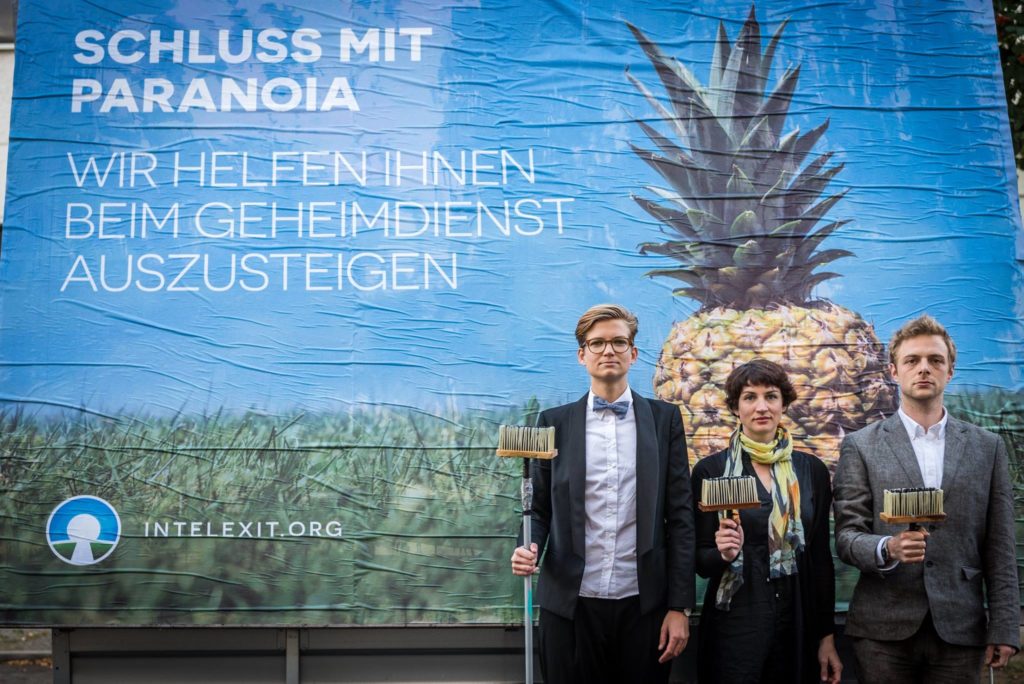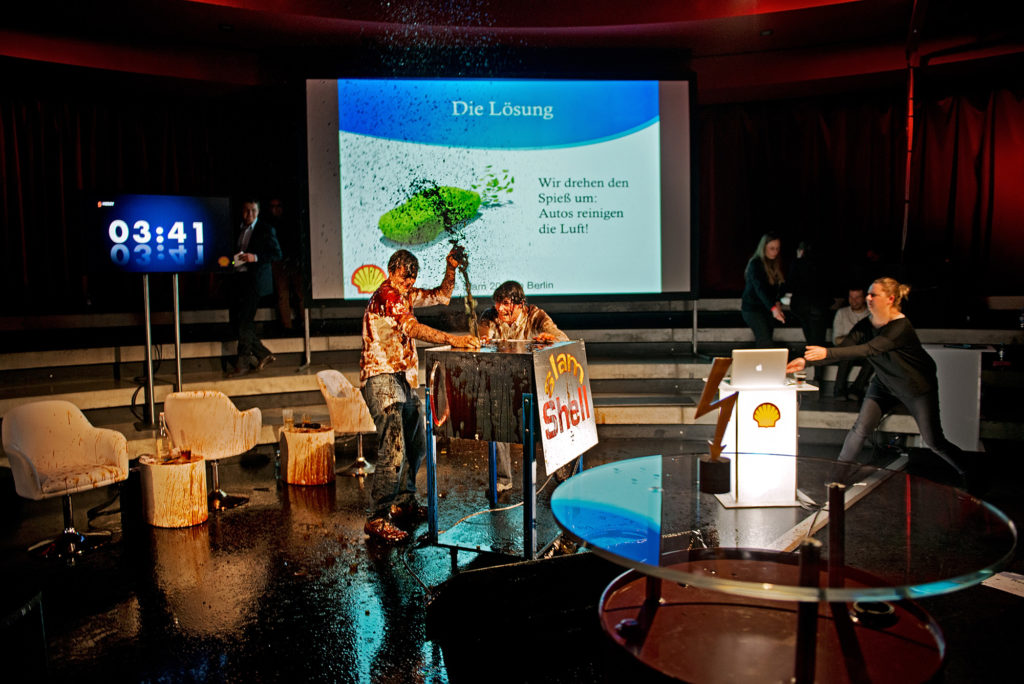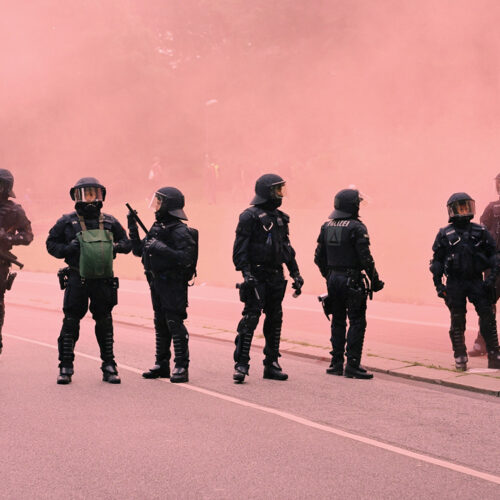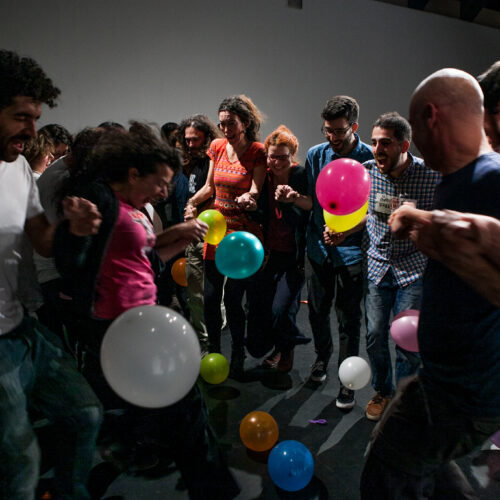A Bit About the Peng! Collective
Peng! is an experimental laboratory for new forms of radical protest. The collective is a young and daring group that consistently bangs the artivism drums in order to “wake up the post-democratic zombies and shine the torch down the rabbit holes of social and political injustice”. They draw inspiration and learn from the arts, hacking, politics and big business in order to design provocative and critical culture-jamming interventions.

They inject new voices, new positions and new frames into social and political debates and in turn inspire and shake up the humdrum of traditional campaigning and activism. For instance, a couple of years ago they launched a three-stage campaign against German small arms exports, which received large press coverage and social media attention and after which Germany’s second biggest party SPD included a ban on small arms exports in their party platform. Also, just before the borders opened in 2015, they called for direct action for giving rides to refugees in Europe, which sparked the debate around the legitimacy of civil disobedience in the face of a humanitarian crisis, a discussion that even ended up in Austrian parliament. Additionally, Call-A-Spy, was their art installation that allowed regular citizens to gain personal contact through phone calls with the men and women working in intelligence agencies.
Peng! stands firmly on the idea that a healthy democracy needs a strong and courageous civil society. Civil society should rival big business and governments in its ability to influence public discourse. It should also draw from the same tools and respond with similar levels of agility and deftness to respond to social and political problems.
To achieve this, civil society needs to develop tools and tactics to mobilise people, to strengthen progressive voices and to work in such a way that connects issue areas, joining fights when relevant. There are a number of organisations doing very thorough research and advocacy work but it rarely enters the mainstream. Or there is a lack of creativity to think about how to cause media momentum to increase spread. Peng! sees itself as a provider of both tools and tactics for civil society, a bridge and cross-pollinator of groups and issues as well as an amplifier of unnoticed issues.

What is Peng!’s Theory of Change?
One of Peng!’s long-term goals is to revolutionise the way in which civil society behaves towards global injustice. As artists, theorists and activists they regard the world as alterable – and especially alterable by cultural and social practice. Peng! as one initiative will probably not lead to system change, they say that “more and more people and groups using creative methods to take steps to protest, point towards political imbalances and articulating demands to decision-makers can create a different climate. A climate that makes it less easy for corporations and state bodies to remain unnoticed with what they would like to hide.”
To do that, Peng! wants to provide progressive social movements with new tactics and strategies for successful mobilisation and empowerment. They want to create little ‘islets of courage’ that will inspire other progressive forces to expand their more conservative campaigning toolkits with more radical ideas. The Peng! crew believe that the existing drive towards a rather lukewarm mainstream, that most NGOs are following, clearly has its limits in a diverse society – thus they want to provide a diverse, creative way of communicating messages. As a small, independent non-institutionalised group of fierce and fearless performers they can break the limits and create utopian scenarios that challenge the media and the public. Ideally every project leaves behind some new cultural practice of protest.

To create this change, they target big players who are both allies and opponents:
I Allies
a) The Big and Small NGOs
Organisations like Oxfam, Greenpeace or ACLU are political allies who are searching for new forms of mobilisation and empowernment. By showing that a non-compromising stance on political questions that does not count numbers of potential supporters in the mainstream and by filling these positions into inspiring and charming forms of communication, they show alternatives to established forms of campaigning.
b) Theatres and the Arts Sector
While the fine arts is open to any content, political or not, it often is isolated and does not leave the cultural and elitist sphere. On the other side, artistic performances can depoliticise activist actions to mere symbols. This is why the Peng! crew always use the protection that “freedom of arts” grants them in Germany, but reach out of the bubble of the art world in order to exert concrete change and influence the “real world” – for example by letting the audience call actual intelligence officers.
c) Media and Investigative Journalists
Through bold and subversive spins we reveal new information. Peng! uses methods that would be ‘unethical’ for many journalists to use, but the results are often intriguing when the big corporations have to react. Then, they create a narrative that helps journalists who want to report about a certain complex political topic but don’t have a story to open with. After their action, they can publish a more thorough report about it that also shows political need for action beyond our current media tactics.
Peng! regards these allied forces as catalysts for their political agenda of long term change and a strengthened civil society and social movements somewhere “on the left”.

II Opponents
a) Corporations
Peng! attacks them to reveal their PR strategies and bring their actions into a more honest, realistic context. But they don’t believe in voluntary self-regulation of private industry. They place more trust in public pressure by civil society and critical media outlets.
b) Politicians
Political discourses have been changing more and more towards sensationalism. With their generally spectacular actions Peng! use this development but always try to infuse a complex political analysis – instead of just boycotting it. However, it is crucial to continuously push the political sphere to take control and act responsibly, to check the accountability of the elites either in political or corporate power.
When Peng! plans a campaign they always try to find suitable windows of opportunity to to push an ongoing discourse in a desired direction. This influenced many of their campaigns, for example did Google have a PR problem for its nasty fight with German publishers when they openly attacked them with the Google Nest campaign, Twitter was facing massive criticism because it found no way of dealing with sexist behavior when they launched the Zero Trollerance campaign and after the German government has adopted a “national action plan” to eliminate human rights violations along the supply chains of multinational corporations, they launched the campaign against exploitation of the global south to put even more pressure on those corporations to justify the working conditions in their producing countries.
Since Peng! work in their adbusting, radical action way, keeping things secret and under wraps is absolutely fundamental in order for these actions to succeed, therefore we are not able to divulge any information about what it is that we are supporting, so let’s just call it core support. After all, the action that will be funded via our guerrilla grant is reflecting the values and objectives delineated above, so you can at least have a taste for the kind of project that is being incubated as we speak.



